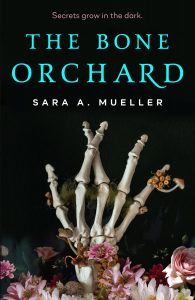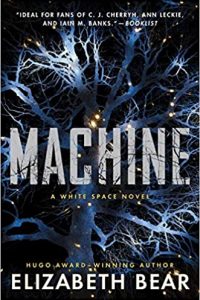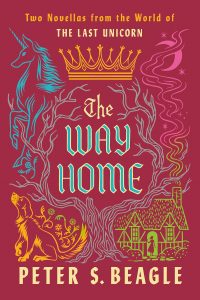Caren Gussoff Sumption Reviews The Bone Orchard by Sara A. Mueller
 The Bone Orchard, Sara A. Mueller (Tor 978-1-250-77694-5, $27.00, 432pp, hc) March 2022.
The Bone Orchard, Sara A. Mueller (Tor 978-1-250-77694-5, $27.00, 432pp, hc) March 2022.
Sara A. Mueller’s debut novel, The Bone Orchard, is a brilliant, cautionary tale about the dangers of repressing trauma, disguised as a sweeping fantasy about political machinations and magic. Charm, proprietor of Orchard House – the high-class pleasure club of Boren – is also the mistress of the Emperor. It’s a relationship built less on love than a type of ultimate loyalty; Charm is controlled by a ‘‘mindlock,’’ a small device programmed by the Emperor’s psychic ability, which compels her obedience and fealty to him. And in this world, deeply divided by class, scarred by war, and ruled by duplicitous, power-hungry nobles, loyalty – even that which is forced – is worth its weight in, well, anything.
As Charm is controlled by the Emperor, so she oversees every detail at Orchard House, including the daily duties of its women: the vat-grown ‘‘boneghosts’’ who are animated by, and named after, fragments of a single personality known as the Lady. Charm herself shares her mind and body with the Lady, while Pain, Pride, Justice, Shame, and Desire have each been spun off into unique bodies, by a process only the Lady has mastered. The process involves something like science, something akin to necromancy, and quite a bit of hand waving.
Each boneghost has her own particular talent thanks to the specific fragment of personality she is, making each preferred by different types of clientele for different reasons. Pain can absorb and relieve pain from another. Justice is physically small and delicate. Desire loves unconditionally. All of them, though, are trusted secret-keepers, and these skills and discretion prove essential to completing the last mission given to Charm by the dying Emperor.
Someone has poisoned the Emperor. He believes it’s one of his troubled, dangerous sons, and tasks Charm to discover which and kill them. If she is successful, she will no longer be subject to the control of her mind-lock, but until that success, her mind-lock will never allow her to abandon the task.
Solving the crime pulls Charm neck-deep into danger and intrigue, and as she and the boneghosts untangle the tightly braided ambitions and plots, the women also find themselves remembering bits about their place in the bloody history of Boren, the invasion of their home country of Inshil, and their relationship with the Emperor and his son, Prince Luther.
Here is where fans of political gambits and chicanery will find satisfaction. There’s no shortage of moves in the bloody chess match that makes up the setting of The Bone Orchard, and as nobles filter in and out of Orchard House for cards, wine, and, uh, relaxation, we learn much about each of the players – layers and layers of history, affinities, familial relationships, and scandals. Readers with less of an appetite for power struggles may find these sections slow and somewhat confusing; the cast of ‘‘Uptown’’ characters (nobles) feels like thousands, while the ‘‘Lowtown’’ villagers seem interchangeable. Even skimming, readers should be able to pick up enough information to follow, at least, the general gist of the matters of state.
Finding the killer drives the plot, but the piecing together of the past is what gives The Bone Orchard substance. Each boneghost is a portion of a whole, and holds within her a segment of the past. The Lady, obviously traumatized by her memories, perfected this reanimation technique as a way to forget what she has lived through by literally separating it from herself. So she is less than helpful, without going as far as sabotage, as Charm and the boneghosts share what they remember. In the end, to truly free themselves, they must not only find the assassin and break the mindlock, they must fuse themselves back together to look at – and deal with – what happened to them.
Mueller handles trauma elegantly. Making a metaphor of disassociation, a common coping mechanism of trauma, into concrete characters pushes fantasy towards its pinnacle as a genre: as not just an escape from reality, but a mirror to reality. And Mueller doesn’t flinch from portraying the horrors, either. Though the boneghost characters are frequently flatly depicted, this flatness is deliberate. They are simply parts of a whole person, and Mueller never allows us to forget this. What happened to the Lady Charmaine is truly awful, the stuff of nightmares, at a level deserving of a nearly complete splintering of her self into selves. In our world, trauma survivors do not have the option of splitting off their fear and anguish into other bodies, but the wish to do so is perfectly captured. In both The Bone Orchard and here, the only way to heal and achieve true freedom is to integrate the trauma, set the past in the past, and find a way to carry on.
Caren Gussoff Sumption is a writer, editor, Tarot reader, and reseller living outside Seattle, WA with her husband, the artist and data scientist, Chris Sumption, and their ridiculously spoiled cat-children.
Born in New York, she attended the University of Colorado, the School of the Art Institute of Chicago, Clarion West (as the Carl Brandon Society’s Octavia Butler scholar) and the Launchpad Astronomy Workshop. Caren is also a Hedgebrook alum (2010, 2016). She started writing fiction and teaching professionally in 2000, with the publication of her first novel, Homecoming.
Caren is a big, fat feminist killjoy of Jewish and Romany heritages. She loves serial commas, quadruple espressos, knitting, the new golden age of television, and over-analyzing things. Her turn offs include ear infections, black mold, and raisins in oatmeal cookies.
This review and more like it in the March 2022 issue of Locus.
 While you are here, please take a moment to support Locus with a one-time or recurring donation. We rely on reader donations to keep the magazine and site going, and would like to keep the site paywall free, but WE NEED YOUR FINANCIAL SUPPORT to continue quality coverage of the science fiction and fantasy field.
While you are here, please take a moment to support Locus with a one-time or recurring donation. We rely on reader donations to keep the magazine and site going, and would like to keep the site paywall free, but WE NEED YOUR FINANCIAL SUPPORT to continue quality coverage of the science fiction and fantasy field.
©Locus Magazine. Copyrighted material may not be republished without permission of LSFF.







